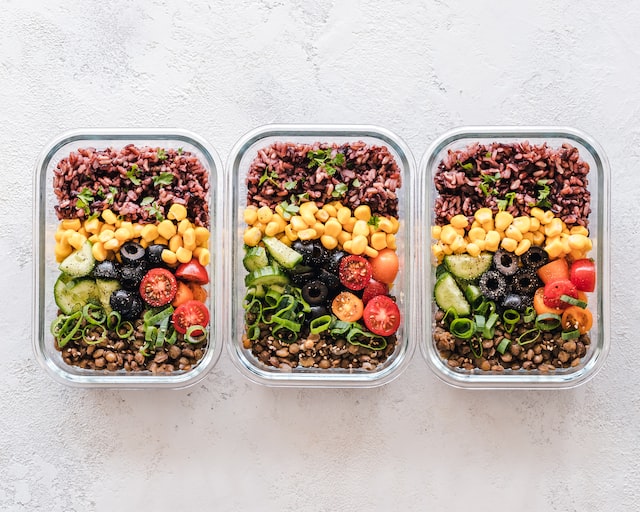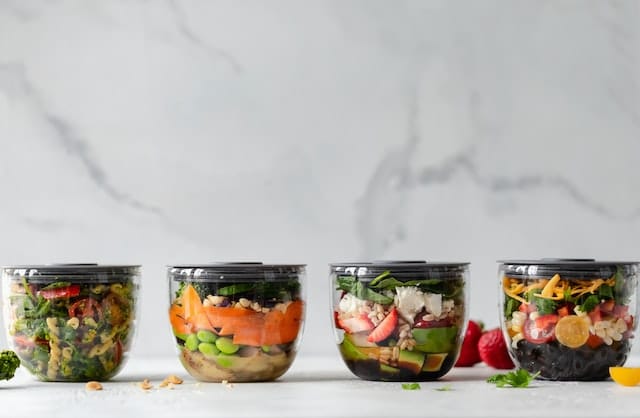Introduction – Reducing Food Waste
Reducing food waste is an excellent way on cutting down consumption, and therefore, carbon emissions. Freezing food for storage is a great way to extend the shelf life of food and reduce food waste. Freezing is a good way of preserving meat, fish, poultry, and vegetables. You can do it for short-term or long-term storage.

The discomfort here is that there are people who don’t like to use plastic wraps and bags because these materials are not biodegradable and are a source of pollution. Traditional plastics take many centuries to decompose and leach chemicals into the environment. Additionally, many plastic wraps and bags are made from petroleum-based plastics which can be bad for the environment due to the energy and resources used to create them.
Fortunately, several other effective methods for freezing food do not involve using plastic bags. Some of these include vacuum packaging and freeze-drying. Both these methods help prevent the loss of nutrients and flavor while making food storage more convenient. With the right approach, you can preserve your food safely and enjoy its delicious flavor for a long time!
How To Freeze Food Without Plastic?
Many rely on plastic containers or bags to store and freeze their food, which causes unnecessary waste and harm to the environment. Luckily, there are several alternative options for freezing food without plastic. We give you our top 6 recommendations.
1. Glass Containers
Glass containers are an excellent option for storing and freezing food without relying on plastic. Not only are they reusable, but they also don’t leech any chemicals or odors into your food like plastic cans. Plus, glass containers come in a wide range of sizes and shapes, making them versatile for various uses. When it comes time to clean them, you can simply toss them in the dishwasher for hassle-free maintenance. And if a glass container happens to break, it is recyclable and won’t add to the growing mountains of plastic waste in landfills and oceans.
2. Beeswax Food Wrap
Beeswax food wrap is a great alternative for a plastic-free way to store your food. You can use this reusable wrap instead of plastic wrap or bags to keep your food fresh; made from organic cotton, beeswax, and tree resin. It’s also easy to care for – just wash with cool water and mild soap, then let air dry. And if it does wear out over time, it’s completely biodegradable and can be composted with food scraps. Plus, using beeswax wrap supports beekeepers and their bees, helping to preserve an essential part of our ecosystem.
3. Stainless Steel
Stainless steel is a great choice for storing and freezing food without relying on plastic. It looks sleek and modern and doesn’t leech chemicals or odors into your food as plastic containers can. Plus, stainless steel comes in many shapes and sizes, so you can find one that works well for any type of food you need to store. When it comes time to clean your stainless steel containers, wash them with hot soapy water and let them air dry. And if your container ever becomes damaged or worn out, you can recycle it without any negative environmental impact.
4. Parchment Paper
One of the most versatile tools in the kitchen, parchment paper is great for baking and roasting, but you can also use it to freeze food without using plastic. Simply place your food onto a sheet of parchment paper and freeze it flat, then transfer it to a container or plastic bag once frozen. This method eliminates excess plastic waste and helps keep your frozen food from getting freezer burn. Parchment paper can also be used as an eco-friendly alternative to aluminum foil for wrapping sandwiches and snacks on the go or as a makeshift pot lid for boiling or steaming foods.
5. Silicone Food Storage Bags
Silicone bags offer a sustainable alternative, as they are reusable and dishwasher-safe. Plus, their unique expandable design takes up minimal space in your freezer. Not only can you freeze food without using plastic, but these silicone bags can also safely go from the freezer straight into the microwave for easy heating. And when it’s time to clean up, simply fold them flat for easy storage until next time. With all these perks, silicone food storage bags are a practical and eco-friendly solution for conscientious consumers.
6. Aluminum Foil
Aluminum foil also offers a great alternative to plastic wraps or bags. Not only does it help to effectively freeze and seal in flavors, but it also avoids the negative environmental impacts of plastic. Aluminum foil can be washed and reused multiple times before being recycled, making it a much more sustainable option. It’s also preferable for cooking as it doesn’t release any chemicals into your food when heated. So next time you’re looking for a way to preserve leftovers or freeze items for future meals, consider reaching for aluminum foil instead of plastic wrap. Your taste buds and the environment will thank you.

Other Ways To Reduce Food Waste
1. Plan meals ahead of time: Planning meals ahead of time can help ensure that you’re only buying what you need and will use.
2. Buy in bulk: Bulk purchasing can save money and reduce food waste.
3. Store food properly: Storing food in the right way can help keep it fresher for longer.
4. Use leftovers: Leftovers can be transformed into a delicious meal the next day.
5. Donate extra food: Donate extra food to local food banks or shelters.
6. Compost food scraps: Composting food scraps can help keep food out of landfills.
7. Educate others: Talk to family, friends, and neighbors about how they can reduce food waste.
Summary
So if you’re looking for a plastic-free way to store and freeze your food, many great options are available that won’t harm the environment or your health. Whether you choose glass containers, beeswax wrap, or stainless steel, you’ll be able to keep your food fresh without adding to the growing problem of plastic pollution in our world today.
